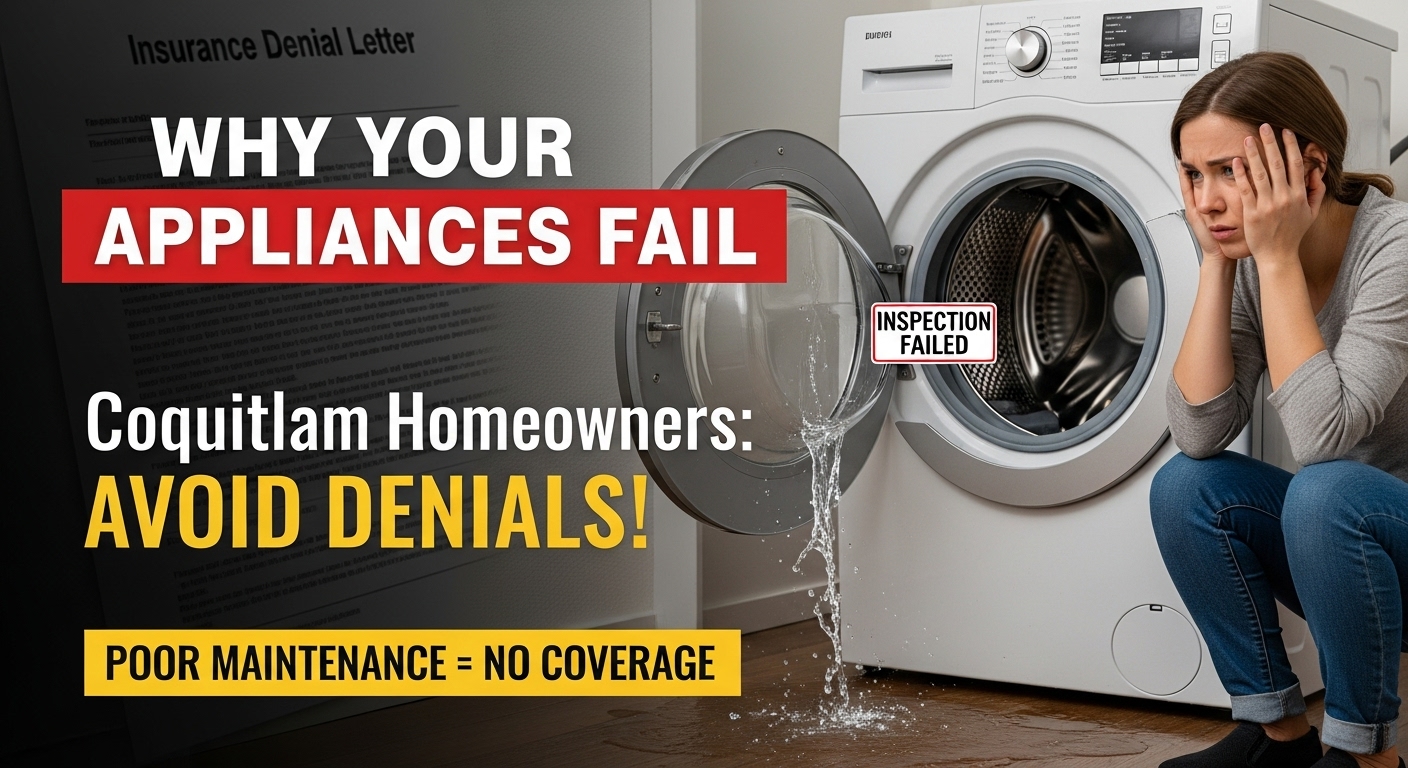
Worried about your dishwasher failing its next insurance inspection and leaving you without coverage when you need it most? Discover the hidden pitfalls that insurance companies use to deny appliance claims and learn exactly how Coquitlam homeowners can protect themselves from devastating coverage gaps through proper maintenance documentation. Homeowners throughout Coquitlam are discovering a harsh reality when their insurance claims get denied: having coverage doesn’t guarantee your claim will be approved. The difference between a successful claim and a devastating denial often comes down to one critical factor that most homeowners completely overlook. Insurance companies are increasingly using appliance maintenance requirements as grounds for claim denials, and they’re winning these disputes because homeowners can’t produce the specific documentation that proves they fulfilled their maintenance obligations. This isn’t about minor technicalities or insurance company greed – it’s about contractual requirements embedded in every homeowners insurance policy that make appliance maintenance a legal obligation rather than an optional activity. 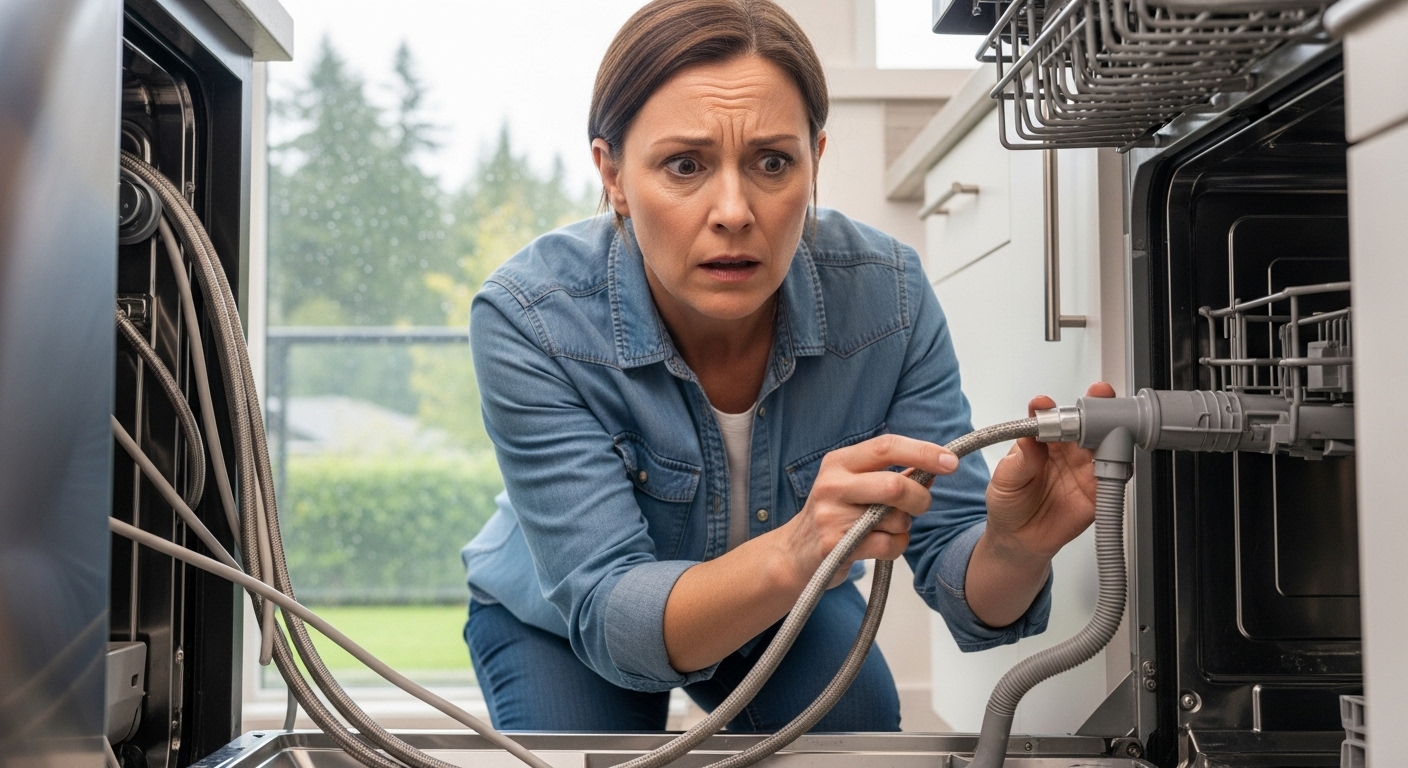 Understanding why appliances fail insurance inspections requires recognizing that insurers view your home through a risk assessment lens rather than a comprehensive evaluation perspective. When an inspector visits your Coquitlam property, they’re specifically looking for conditions that could result in expensive insurance claims down the road. Your dishwasher’s cosmetic condition matters less than whether its hoses show signs of deterioration that could cause water damage. Your refrigerator’s age is less important than whether its condenser coils are clogged with debris that could cause mechanical failure. The inspection focuses on liability prevention rather than overall appliance performance, which means that even functioning appliances can fail inspection if they show signs of neglect or pose elevated risk factors. The relationship between proper maintenance and insurance coverage extends far beyond the initial inspection. Even after your appliances pass inspection and your coverage remains active, insurance companies can still deny claims if they determine that you failed to maintain the appliance according to manufacturer specifications. This dynamic creates an ongoing obligation that continues throughout your entire period of ownership, making maintenance documentation perhaps the most important aspect of appliance ownership from an insurance perspective. **Key Outtakes:**
Understanding why appliances fail insurance inspections requires recognizing that insurers view your home through a risk assessment lens rather than a comprehensive evaluation perspective. When an inspector visits your Coquitlam property, they’re specifically looking for conditions that could result in expensive insurance claims down the road. Your dishwasher’s cosmetic condition matters less than whether its hoses show signs of deterioration that could cause water damage. Your refrigerator’s age is less important than whether its condenser coils are clogged with debris that could cause mechanical failure. The inspection focuses on liability prevention rather than overall appliance performance, which means that even functioning appliances can fail inspection if they show signs of neglect or pose elevated risk factors. The relationship between proper maintenance and insurance coverage extends far beyond the initial inspection. Even after your appliances pass inspection and your coverage remains active, insurance companies can still deny claims if they determine that you failed to maintain the appliance according to manufacturer specifications. This dynamic creates an ongoing obligation that continues throughout your entire period of ownership, making maintenance documentation perhaps the most important aspect of appliance ownership from an insurance perspective. **Key Outtakes:**
- Insurance companies deny appliance claims primarily due to lack of maintenance documentation, not because of coverage exclusions or policy limitations
- Water heaters over ten years old face automatic scrutiny during inspections, with some insurers requiring replacement or imposing higher deductibles for related claims
- Coquitlam’s wet climate creates elevated water damage risks that make appliance maintenance more critical for insurance compliance than in drier regions
- Anti-tip brackets on ranges, proper water line connections, and adequate ventilation represent common inspection failure points that most homeowners can address proactively
- Professional maintenance documentation provides the strongest defense against claim denials, making annual appliance inspections a worthwhile investment for insurance protection
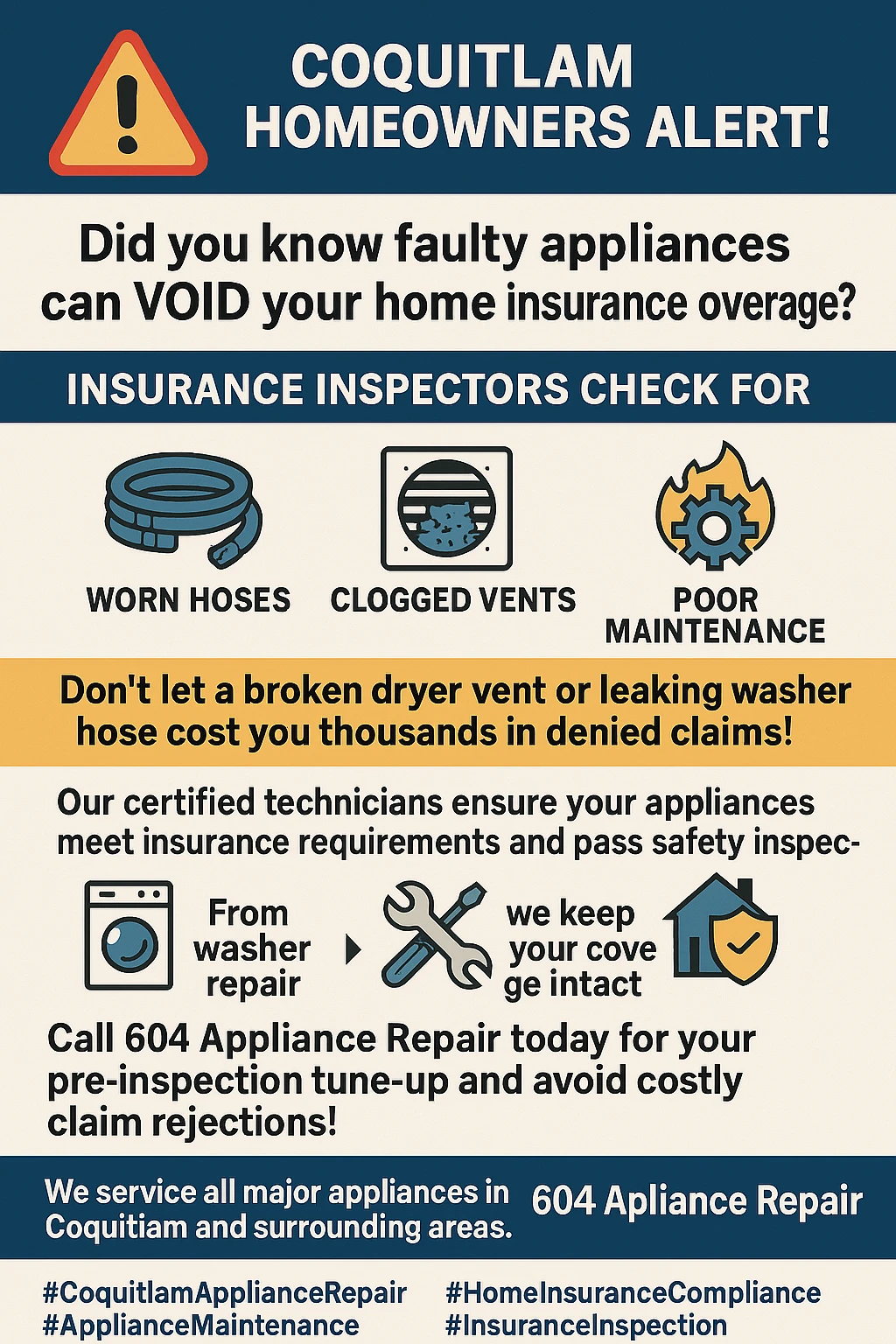
Understanding How Insurance Inspections Evaluate Appliances
Home insurance inspections have evolved into sophisticated risk assessment processes that evaluate appliances through specific criteria designed to predict claim likelihood and severity. Unlike the comprehensive home inspections that buyers conduct before purchasing property, insurance inspections focus narrowly on identifying potential sources of expensive claims. The inspector’s primary objective involves cataloging conditions that could result in fire damage, water damage, or safety hazards that would trigger insurance payouts. Appliances receive particular attention because they represent both high-frequency claim sources and potentially catastrophic loss scenarios when they fail unexpectedly.
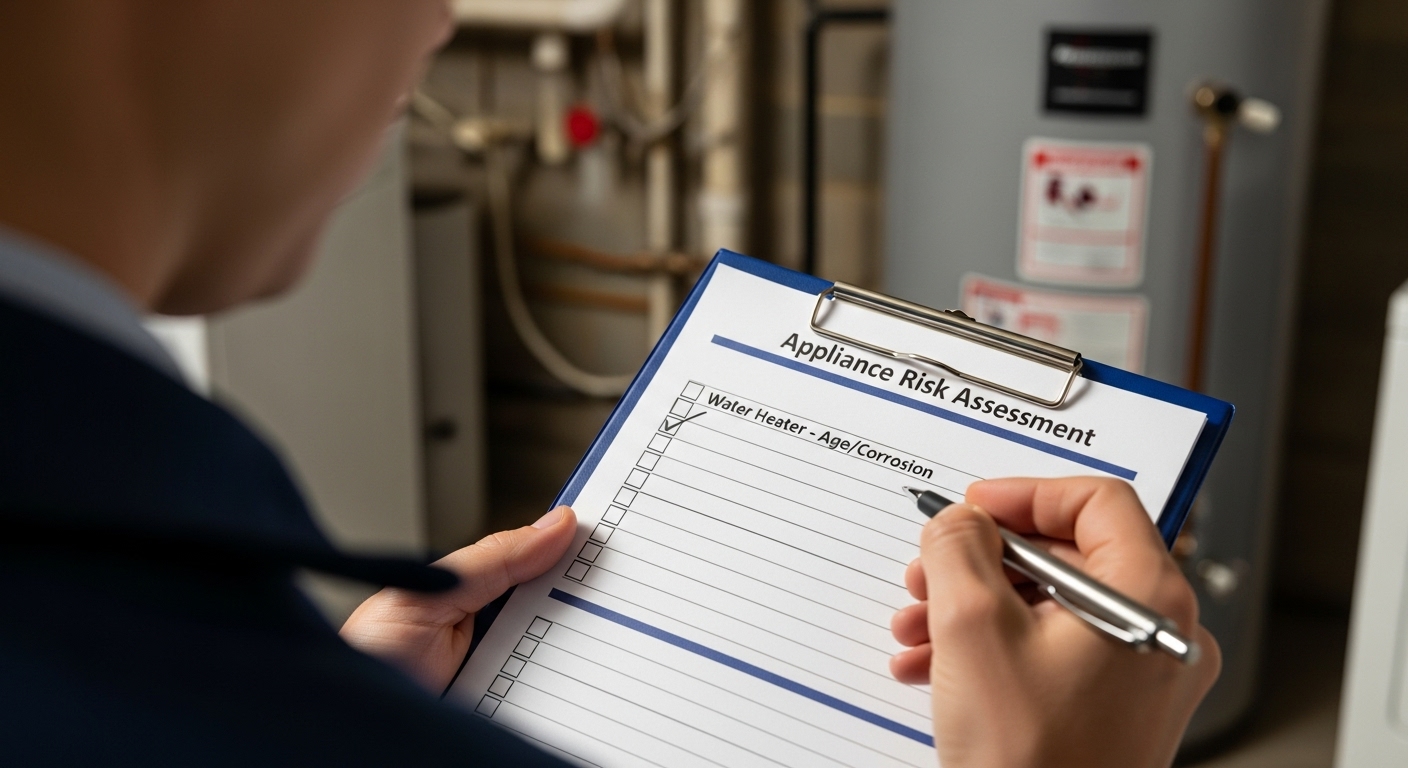
The scope and intensity of appliance evaluation during insurance inspections varies significantly based on your home’s age, condition, and claim history. Newer homes in Coquitlam may receive primarily exterior inspections with limited appliance scrutiny, while homes over twenty-five years old typically face comprehensive interior evaluations that include detailed appliance assessments. Insurance companies have specific protocols for evaluating different appliance categories, with water-using appliances like dishwashers, washing machines, and water heaters receiving the most intensive evaluation due to their water damage potential. Gas appliances face scrutiny related to fire and safety hazards, while electrical appliances are evaluated within the context of your home’s overall electrical system capacity and safety.
Insurance inspectors in Coquitlam operate with region-specific knowledge about local housing stock, climate factors, and common risk patterns that influence their evaluation criteria. British Columbia’s wet climate means that water damage represents a heightened concern compared to drier regions, making appliance water connections and drainage systems more critical during inspections. Many Coquitlam homes contain polybutylene plumbing, knob-and-tube wiring, or other materials that insurance companies view as elevated risk factors. Understanding these regional considerations helps homeowners anticipate inspection challenges and address potential problems before they result in coverage limitations or premium increases.
The evaluation process extends beyond simple visual inspection to include documentation review and maintenance history assessment. Inspectors may request maintenance records, warranty information, and service receipts to verify that appliances have received proper care throughout their operational life. This documentation requirement represents a critical aspect that many homeowners overlook until they face claim denials based on inadequate maintenance evidence. The absence of maintenance documentation creates a presumption that proper care was not provided, which gives insurance companies grounds for denying claims even when the underlying damage might otherwise qualify for coverage.
Documentation Requirements That Determine Coverage Success
The relationship between maintenance documentation and insurance claim success cannot be overstated in its importance for Coquitlam homeowners. Insurance policies contain specific language requiring homeowners to maintain appliances according to manufacturer specifications, and this requirement transforms from aspirational guidance into a legally enforceable obligation when claims are filed. Comprehensive maintenance documentation serves as your primary defense against claim denials, providing tangible proof that you fulfilled your contractual maintenance obligations regardless of the underlying cause of appliance failure.
Effective maintenance documentation requires systematic record-keeping that begins when you first acquire an appliance and continues throughout its operational life. Essential documentation includes dated service logs recording every maintenance activity performed, receipts and invoices from professional service visits, photographic evidence of maintenance tasks completed, warranty documents and manufacturer maintenance requirements, and records of parts or materials replaced during routine service. Each maintenance entry should specify the date, the specific tasks completed, the technician’s name and company affiliation for professional service, and any recommendations provided for future maintenance needs.
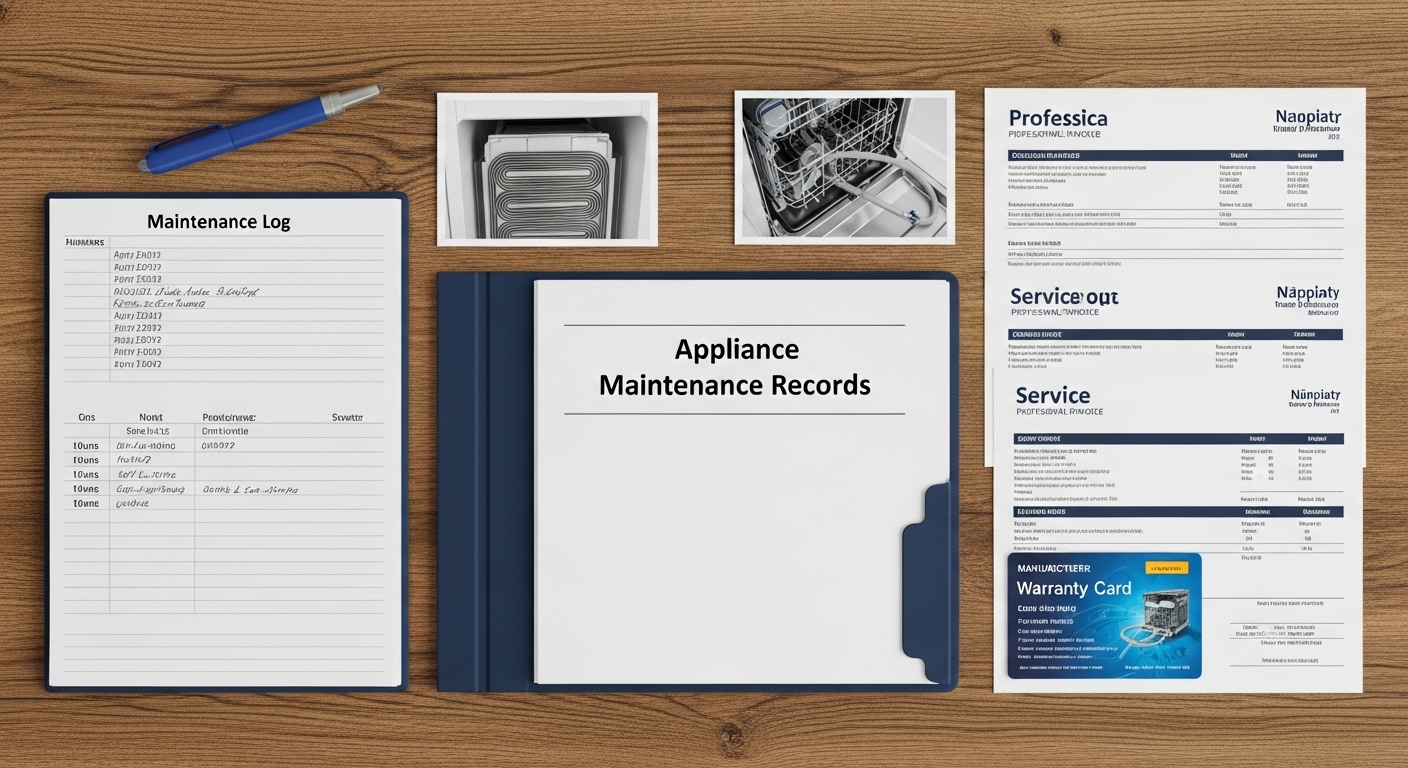
Insurance adjusters specifically look for gaps in maintenance documentation when evaluating claims, as these gaps suggest periods of neglect that could have contributed to appliance failure. A homeowner who can produce monthly filter change records, annual professional inspection reports, and receipts showing proactive replacement of wear parts demonstrates compliance with manufacturer recommendations and creates substantial difficulty for insurance companies attempting to deny claims based on maintenance allegations. Conversely, homeowners without documentation face an uphill battle proving that they provided adequate care, regardless of their actual maintenance efforts.
The burden of proof in appliance-related insurance claims effectively shifts to the homeowner, requiring you to demonstrate through documented evidence that proper maintenance was provided. This dynamic explains why maintenance documentation has become the single most important factor determining claim success or failure. Insurance companies don’t need to prove that you failed to maintain your appliance; rather, you must prove that you maintained it properly through comprehensive documentation that addresses manufacturer requirements and industry standards.
Common Appliance Failure Points During Inspections
Appliance failures during insurance inspections typically result from a combination of age-related deterioration, visible neglect, and installation deficiencies that create elevated risk profiles from the insurer’s perspective. Understanding typical appliance lifespans helps homeowners anticipate inspection challenges and plan proactive replacements before reaching critical failure points. Refrigerators typically last thirteen years, washing machines approximately ten years, dishwashers around nine years, gas ranges about fifteen years, and water heaters between ten and twenty years depending on maintenance quality and water conditions.
Age alone does not automatically disqualify appliances from passing insurance inspections, but age combined with visible deterioration creates compelling evidence of elevated failure risk that concerns insurers. A twelve-year-old refrigerator with clean condenser coils and proper operation may pass inspection, while a seven-year-old refrigerator showing rust, leaks, or mechanical problems will likely fail due to evidence of inadequate maintenance. Visual ** RETURN A TOTAL OF 3 IMAGE PROMPTS AND THE BLOG WITH THEIR PLACEHOLDERS. * DO NOT USE /n or CHARACTERS **
